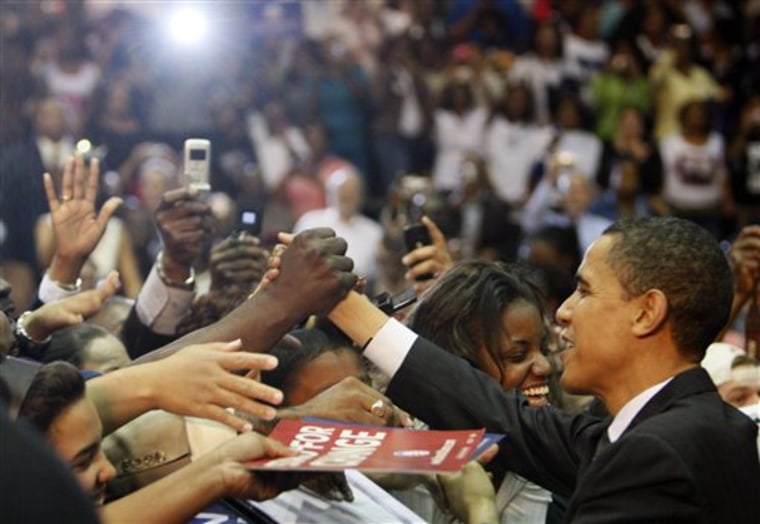NBC News declared Barack Obama as the projected winner in the Mississippi primary late on Tuesday, the latest in a string of racially polarized contests across the Deep South and a final tune-up before April's high-stakes race with Hillary Rodham Clinton in Pennsylvania.
“Now we look forward to campaigning in Pennsylvania and around the country,” Maggie Williams, Clinton’s campaign manager, said in a written statement that congratulated Obama on his victory.
“I’m confident that once we get a nominee, the party is going to be unified,” Obama said in claiming his victory in Mississippi.
Clinton was attending a presidential forum in Washington on Wednesday. Obama planned to be in his hometown of Chicago.
Obama was winning roughly 90 percent of the black vote but only about one-third of the white vote, extending a pattern that carried him to victory in earlier primaries in South Carolina, Alabama, Georgia and Louisiana.
His projected triumph was widely expected and seemed destined to do nothing to shorten a Democratic marathon expected to last at least six more weeks — and possibly far longer — while Republicans and their nominee-in-waiting, Sen. John McCain, turn their attention to the fall campaign.
Returns from 92 percent of Mississippi's precincts showed Obama gaining 59 percent, to 39 percent for Clinton.
Nearly one in five Democratic primary voters called himself an independent. About one in 10 was Republican.
Six in 10 Obama supporters said he should pick the former first lady as his vice presidential running mate if he wins the presidential nomination. A smaller share of Clinton's voters, four in 10, said she should place him on the ticket.
Delegates at stake
There were 33 Democratic National Convention delegates at stake, and Obama looked to regain at least some of the luster he lost a week ago with defeats in three of four primaries. He is the strongest black presidential candidate in history and hoped the racial makeup of Mississippi would work to his advantage.
Neither of the two rivals appears able to win enough delegates through primaries and caucuses to prevail in their historic race for the nomination, a development that has elevated the importance of nearly 800 elected officials and party leaders who will attend next summer's national convention as unelected superdelegates.
Obama leads Clinton among pledged delegates, 1,368-1,226 in the Associated Press' count, while the former first lady has an advantage among superdelegates, 247-211.
The Associated Press and NBC news conduct separate delegate counts. NBC's national pledged delegate count stands at 1,242 for Clinton and 1,394 for Obama after allocating 15 Mississippi delegates to Obama and 12 to Clinton. Six more delegates were yet to be allocated.
Adding to the uncertainty of the nominating campaign, Democrats from Florida and Michigan are pressing for their delegations to be seated at the convention.
Both states were stripped of their delegates by the Democratic National Committee after they held early primaries in defiance of party rules. But efforts are under way to find a compromise that would satisfy party leaders in both states as well as the candidates, possibly through primaries-by-mail.
As for Mississippi, blacks have voted overwhelmingly in Obama's favor in Democratic primaries so far, and as a group they accounted for more than half the vote in the 2004 Democratic primary in this state.
Obama has defeated Clinton in primaries in South Carolina, Alabama, Georgia and Louisiana, other states where blacks cast a large share of the ballots.
Both contenders campaigned in the state, although the former first lady seemed to go out of her way to say she did not expect to win.
"Some people have said 'Well Mississippi is very much a state that will most likely be in favor of Senator Obama.' I said 'Well, that's fine,' but I want people in Mississippi to know I'm for you," she said in Hattiesburg before flying to Pennsylvania.
Obama made a stop Tuesday in Greenville before heading to Pennsylvania, too.
"I've been praying for you," a man called out.
"I believe in prayer," Obama replied.
After losing 12 straight primaries and caucuses, Clinton rebounded smartly last week with primary victories in Ohio, Texas and Rhode Island. Obama won the Vermont primary, led in the Texas caucuses, and suffered a loss of only 11 delegates.
But the damage was deeper than mere numbers — costing him a chance to rally uncommitted party leaders to his side, and depriving him of an opportunity to drive the former first lady from the race.
Reinvigorated, Clinton immediately began talking about the possibility of having Obama as her running mate.
Obama ridiculed the idea, saying, "I don't know how somebody who is in second place is offering the vice presidency to the person who is first place."
Other than Pennsylvania, which has 158 delegates at stake, Indiana, North Carolina, West Virginia, Kentucky, Oregon, Puerto Rico, Montana and South Dakota have primaries remaining.
The Associated Press contributed to this report.
